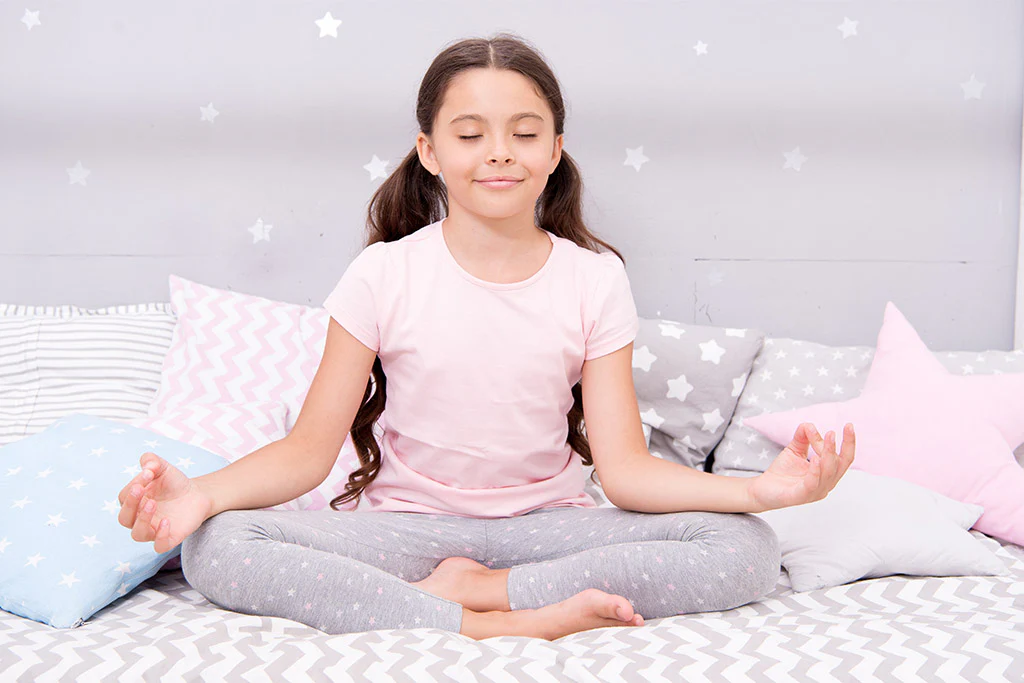In the hustle and bustle of today's world, where schedules are packed, screens are ubiquitous, and stress levels are high even for children, it's no wonder that sleep has become an elusive commodity.
Parents often find themselves grappling with children who struggle to unwind, relax, and drift off into a peaceful slumber. The consequences of inadequate sleep for children are far-reaching, impacting their physical health, cognitive development, emotional well-being, and overall quality of life.
Fortunately, amidst this chaos, there exists a gentle yet powerful solution: sleep meditation for kids.
Sleep meditation offers a holistic approach to improving children’s sleep quality by combining relaxation techniques, mindfulness practices, and soothing imagery to create a tranquil bedtime routine. In this comprehensive guide, we will explore the benefits of sleep meditation for kids, the science behind it, practical tips for incorporating it into their bedtime routine, and the long-term impact it can have on their health and well-being.
Historical Fact
Christiane Kerr founded Calm For Kids (Sleep Meditation) in 1999. She has been practicing and teaching yoga for over 15 years.
Understanding Sleep Meditation for Kids
Sleep meditation for kids is a specialized form of meditation tailored to suit the unique needs and preferences of children. Unlike traditional meditation practices that may require prolonged periods of sitting still and focused attention, sleep meditation aims to gently guide children into a state of relaxation and ease, facilitating the transition from wakefulness to sleep.
At its core, sleep meditation combines elements of mindfulness, visualization, and deep breathing exercises to help children quiet their minds, release tension from their bodies, and cultivate a sense of inner peace. Guided by a parent, caregiver, or recorded audio, children are invited to engage in a series of calming activities designed to promote restful sleep and sweet dreams.
1. The Benefits of Sleep Meditation for Kids
The benefits of sleep meditation for kids extend far beyond a peaceful night’s sleep. Research has shown that regular practice of sleep meditation can have profound effects on children’s physical, mental, and emotional well-being:
1. Improved Sleep Quality:
One of the most immediate and tangible benefits of sleep meditation for kids is improved sleep quality. By helping children relax their bodies and quiet their minds, sleep meditation can shorten the time it takes for them to fall asleep, reduce nighttime awakenings, and increase the duration of deep, restorative sleep cycles.
2. Reduced Stress and Anxiety:
In today’s fast-paced world, children are increasingly vulnerable to stress and anxiety. Sleep meditation provides a safe and nurturing space for children to unwind, release pent-up emotions, and let go of worries before bedtime. Over time, regular practice can help reduce overall stress levels and promote a greater sense of calm and equilibrium in children’s lives.
3. Enhanced Emotional Regulation:
Emotional regulation is a critical skill that children need to navigate the ups and downs of life effectively. Sleep meditation teaches children how to identify and acknowledge their feelings without judgment, fostering emotional intelligence and resilience. By cultivating a greater sense of self-awareness and inner calm, children are better equipped to manage challenging emotions and respond to difficult situations with grace and composure.
4. Improved Concentration and Cognitive Function:
Quality sleep is essential for optimal cognitive function, memory consolidation, and learning. By promoting restful sleep, sleep meditation can enhance children’s concentration, attention span, and problem-solving abilities. This, in turn, can lead to improved academic performance, creativity, and overall cognitive development.
Recommended Reading: PORTFOLIO ASSESSMENT: SHOWCASING TRUE KNOWLEDGE AND SKILLS
5. Strengthened Parent-Child Bond:
Practicing sleep meditation together can strengthen the bond between parents and children. Sharing this calming and nurturing experience creates a sense of connection and intimacy, fostering open communication and mutual trust. As parents and caregivers guide their children through the practice of sleep meditation, they provide a source of comfort, support, and reassurance that extends far beyond the bedtime routine.
2. The Science Behind Sleep Meditation for Kids
The effectiveness of sleep meditation for kids is supported by a growing body of scientific evidence. Based on information from the National Library of Medicine, research indicates that mindfulness practices can yield improvements in children’s attention, executive function, emotion regulation, and social skills. This is achieved by stureducing activity in the amygdala, the brain’s fear center, and increasing activity in the prefrontal cortex, responsible for executive function and self-regulation. Consequently, meditation enables children to respond more effectively to stressors and regulate their emotions more efficiently.
Furthermore, studies have found that mindfulness practices can modulate the autonomic nervous system, leading to reductions in heart rate, blood pressure, and cortisol levels, the body’s primary stress hormone. By promoting relaxation and activating the body’s natural relaxation response, sleep meditation can counteract the physiological effects of stress and promote a greater sense of calm and well-being in children.
3. Practical Tips for Introducing Sleep Meditation to Kids

Introducing sleep meditation to kids requires patience, creativity, and a willingness to experiment. Here are some practical tips for incorporating sleep meditation into your child’s bedtime routine:
1. Establish a Consistent Bedtime Routine:
Consistency is key when introducing any new bedtime routine. Set aside dedicated time each night for sleep meditation, ideally as part of a predictable bedtime routine. By establishing consistent sleep and wake times, you help regulate your child’s internal clock and signal to their body that it’s time to wind down and prepare for sleep.
2. Create a Calm and Comfortable Environment:
Set the stage for sleep meditation by creating a calm and comfortable environment in your child’s bedroom. Dim the lights, eliminate distractions, and create a cozy sleep environment with soft blankets, pillows, and stuffed animals. Consider incorporating soothing elements such as aromatherapy diffusers, gentle music, or nature sounds to enhance relaxation.
3. Choose Age-Appropriate Guided Meditations:
Select guided meditations or relaxation scripts specifically tailored to your child’s age, interests, and developmental stage. Look for recordings or resources that use simple language, playful imagery, and engaging storytelling to capture your child’s attention and imagination. Consider involving your child in the selection process by letting them choose their favorite meditation themes or characters.
4. Practice Mindful Breathing Exercises:
Encourage your child to practice mindful breathing exercises to help them relax and calm their mind before sleep. Teach them to take slow, deep breaths, inhaling through their nose and exhaling through their mouth. You can incorporate counting or visualization techniques to make the practice more engaging and enjoyable for your child.
5. Lead by Example:
Children learn best by example, so consider practicing sleep meditation alongside your child. Participating together not only strengthens your bond but also demonstrates the value of relaxation and self-care. Lead by example, showing them that prioritizing sleep and mental well-being is essential for everyone.
6. Be Patient and Supportive:
Be patient and supportive as your child adjusts to the practice of sleep meditation. Understand that it may take time for them to feel comfortable and reap the full benefits. Encourage them to share their thoughts and experiences without judgment, and celebrate their progress along the way.
Conclusion
In conclusion, sleep meditation offers a gentle yet powerful solution to the challenges of children’s sleep in today’s fast-paced world. By combining relaxation techniques, mindfulness practices, and soothing imagery, sleep meditation can help children unwind, relax, and drift off into a peaceful slumber. The benefits of sleep meditation extend far beyond a good night’s sleep, encompassing improved emotional regulation, enhanced cognitive function, and strengthened parent-child bonds.
Moonpreneur is on a mission to disrupt traditional education and future-proof the next generation with holistic learning solutions. Its Innovator Program is building tomorrow’s workforce by training students in AI/ML, Robotics, Coding, IoT, and Apps, enabling entrepreneurship through experiential learning.





























How to teach my 5 year old to meditate?
You need to develop your own meditation practice and then explain to your children the way. Take time in front of them, even for just five minutes a day, to meditate.